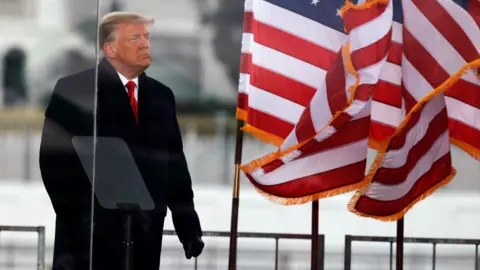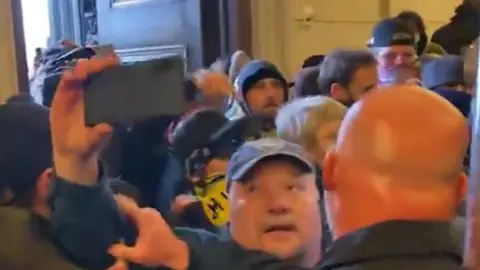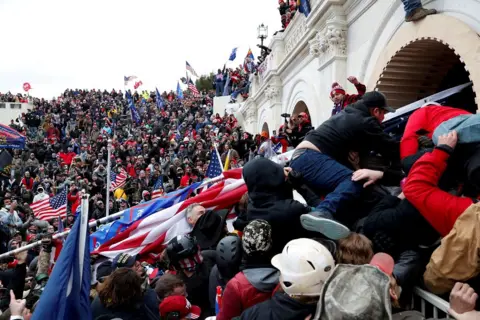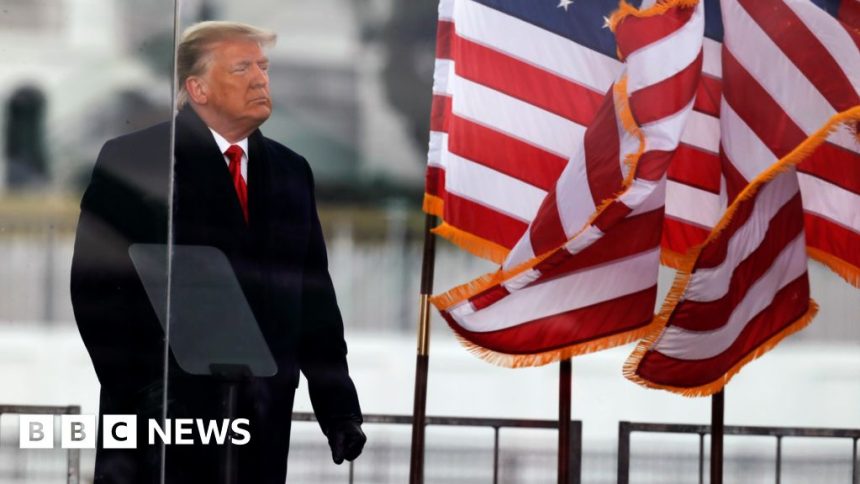Supreme Court rules against Jan 6 riot obstruction charges
 Reuters
ReutersFederal prosecutors overreached when using an obstruction law to charge hundreds of January 6 rioters, the Supreme Court has ruled in an opinion that could affect a case against Donald Trump.
The justices ruled that obstruction charges must include proof that defendants tried to tamper with or destroy documents.
More than 350 people have been charged with obstructing Congress’ business – the certification of the 2020 presidential election.
The law that prosecutors used was passed in 2002, after the Enron scandal, to stop corporate misconduct.
The Sarbanes-Oxley Act outlines criminal penalties for anyone who “alters, destroys, mutilates, or conceals a record, document, or other object”, and another clause includes anyone who “otherwise obstructs, influences, or impedes any official proceeding”.
Justice department prosecutors argued for a broad interpretation of the law to include those who broke into the Capitol on 6 January 2021 in an attempt to keep Trump in the White House.
But in a 6-3 opinion which cut across the Supreme Court’s usual ideological lines, the court ruled that the law should be interpreted relatively narrowly – and used only against defendants who tampered with documents.
How will the decision affect the Trump case?
The ruling has cheered supporters of Donald Trump.
While the court introduced another wrinkle into the special prosecution of the former president – and the Supreme Court could rule in a separate case expected next week that he has immunity for his actions – it is unclear whether the decision will halt one of the charges against him.
“For Trump, I think there will be litigation,” said Aziz Huq, a professor at the University of Chicago Law School.
“But the charges against him involve falsifying or altering ‘records, documents, or objects’. So I think it likely doesn’t undermine those charges.”
In addition, Special Counsel Jack Smith has also charged Trump with other crimes in connection with his attempts to overturn the 2020 result: Conspiring to defraud the US and conspiring against the rights of citizens.
Those charges will go ahead regardless of the outcome of the obstruction case.
The special prosecutor faces an obvious deadline. If Trump wins the November election, he will be able to remove Mr Smith from his post and end the federal legal case.
 US Department of Justice
US Department of Justice What about the other Jan 6 defendants?
The Sarbanes-Oxley Act was one of a number of laws used against those who stormed the Capitol in January 2021.
About 25% of Capitol riot defendants were prosecuted under the law, and according to Attorney General Merrick Garland, all of those faced additional charges.
“The vast majority of the more than 1,400 defendants charged for their illegal actions on January 6 will not be affected by this decision,” Mr Garland said in a statement issued after the decision in which he also noted he was disappointed with the ruling.
The case was brought to the Supreme Court by Joseph Fischer, a former police officer from Pennsylvania who attended Trump’s rally in Washington on 6 January 2021, then briefly went inside the Capitol.
He was seen arguing with police on video before leaving the building.
Lower courts will now decide whether the obstruction charge against him can continue. However, Mr Fischer also faces trial on a number of other charges including civil disorder, disorderly conduct and assaulting, resisting or impeding a police officer.
More than 1,400 people have been charged with crimes related to the riot.
According to justice department figures, more than 500 defendants have been charged with assaulting, resisting, or impeding officers, including more than 130 who have been charged with using a deadly or dangerous weapon or causing serious bodily injury to a police officer.
And more than 1,300 people have been charged with entering or remaining in a restricted federal building or grounds. More than 100 of those have been charged with entering a restricted area with a dangerous or deadly weapon.
With additional reporting from Kayla Epstein
 Reuters
Reuters






